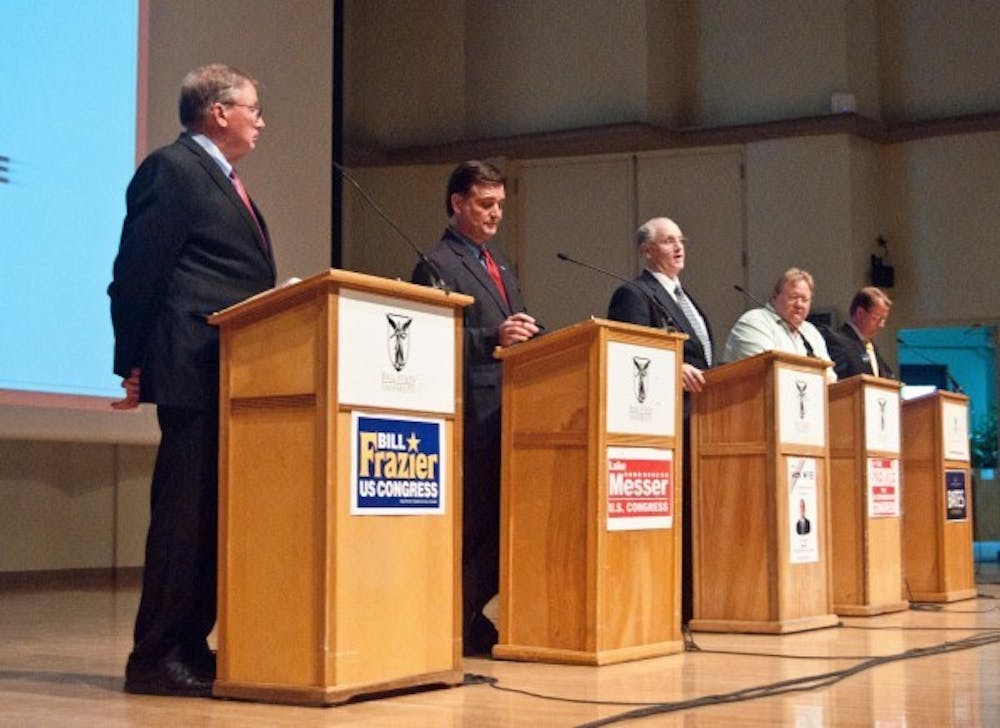Candidates vying for Mike Pence's congressional seat debated education and student health insurance troubles Tuesday night on Ball State's campus.
College Republicans held the Indiana 6th District Congressional Debate in Pruis Hall on Tuesday night, where candidates discussed issues ranging from education reform to foreign aid.
Candidates seeking the Republican nomination during the May 8 primary include Don Bates Jr., Bill Frazier, Luke Messer, Joe Sizemore and Joseph Van Wye.
In the Democratic primary the candidates are Don Bolling, Bradley T. Bookout, Jim Crone, Susan Hall Heitzman of and George T. Holland.
Ball State professor of communications Michael Bauer mediated the debate and questions were assembled for the candidates by a panel consisting of professor of economics Cecil Bohanon, former Muncie mayor Sharon McShurley and chairperson of the History department Kevin Smith.
The topics included the national debt, education reform, the power of Congress to declare war, tax implications, health care and foreign aid.
An issue Bauer mentioned was student health insurance troubles, particularly while in college.
"We've all heard of Geico; we've heard of All State; we've heard of auto insurance companies that are allowed to cross state lines and we've all purchased," Bates said. "College kids have purchased auto insurance that's very, very reasonable.
"We can do the same thing with health insurance and so I believe the solution to the problem is found in free market principles and that's what I will push to make that a reality."
McShurley addressed a question to Van Wye about whether or not the lack of education in America was leading to a national security threat.
"I don't think that there is a problem with security, but I do believe there is a problem and I think that No Child Left Behind was a failure," he said. "I believe we need to let teachers teach instead of teaching what the tests are. Teach."
Many of the candidates said they felt having the debate on Ball State's campus was definitely a benefit to them as well as the community.
"I've said to several college professors before, this is an incredible asset to have in the middle of your congressional district and I plan to use and overuse, this campus when elected to Congress," Messer said. "Not only would it be great to get feedback from all of the students but you have an incredible wealth of knowledge in the professors here."
Sizemore talked about the national debt crisis, voicing his concerns about what is happening to Social Security funds.
"Now as far as entitlement, Social Security, that's a big issue with me because I'm fully vested, [or] that's what they tell me," he said. "Now am I going to get [Social Security] when I get there? I don't know."
"They keep raising [the age of retirement]. I'll probably be dead before I draw on my first Social Security check."
The debate concluded an hour and a half later with a final question about foreign aid and closing statements from all candidates.
"Foreign aid: start out with zero. If you aren't going to be for us, we assume you're against us and these countries, especially in the United Nations, that don't pay their share or almost nothing have the same say-so in a lot of issues that the people are paying the bill," Frazier said. "Relative to the United Nations, the United States: us taxpayers."
For many of the candidates, this wasn't their first time speaking to students on campus, said Holly Gillham, College Republicans president.
"Last semester we hosted several of these guys," Gillham said. "We just brought them up to our regular meeting and we grilled them, because we always grill them. Mediocrity is never good, we expect the best out of our candidates."
Gillham said College Republicans had trouble comparing candidates to one another, so they decided to host a debate.
Despite the debate happening on campus and some of the issues pertaining directly to students, not many attended the event. This was the only debate held on campus this semester, which had many of the students anticipating a great turn out and insightful conversations.
"I was actually really disappointed in the turnout, I don't know why the turnout was so poor but I would have liked to see more people because the candidates touched on some issues that are important to students and their families," senior natural resources and environmental management major Jean Thomas Lejeune said. "I hope to see them do it again; I hope to see this become a tradition, to be continued to be done here."
Hosting the debate is a major undertaking for the Ball State College Republicans.
"Especially being the largest university in the district we are taking a big role in promoting the candidates, even if we're not endorsing someone, we were able to make this open to the public," sophomore political science major John Huston said. "Obviously there's always room for improvement. College students don't turn out mostly for participating in primary elections."
McShurley felt the event was great for Ball State and Muncie in general.
"I think it was a wonderful opportunity for the constituents here in Muncie and Delaware County and anyone who's going to watch the live stream to see the candidates, hear them talking, not necessarily just answering questions, but who they'd be represented by if elected," McShurley said. "... I think we really got a true flavor how each candidate would represent us if we see them in Congress."
The election for the U.S. House of Representatives candidates will take place on May 8.
Sharon Hernandez contributed to this story.



